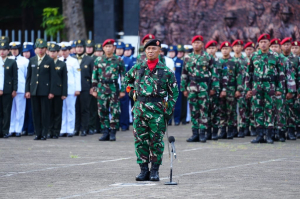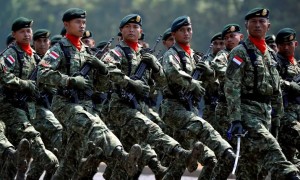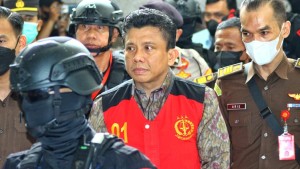New TNI chief should have new approach on South China Sea, Papua issues
The newly appointed Indonesian Military (TNI) Commander Adm. Yudo Margono should have a new and breakthrough concept that prioritizes the role of Indonesian Navy in the future. This is due to the heightened tension of military competition in the South China Sea between the United States and China.
On domestic issue, Margono should minimize, or better terminate, the prolonged conflicts in Papua, which was due to military approach in the most eastern province.
Geopolitical role
"If we see the high tension of the future constellation in Indo-Pacific between the US and China, the increasing military and non-military competition in the South China Sea that connects the Pacific and Indian Oceans, from the military aspect the sea is very important," Global Future Institute (GFI) Executive Director Hendrajit told Indonesia Business Post on December 14, 2022. "Having our TNI Chief from the Navy background will be very important in the constellation for at least the next 6 years."
Margono is slated to be sworn in soon, replacing outgoing Gen. Andika Perkasa from the Army, whose tenure will end on December 21, 2022. Margono, the Navy Chief of Staff, became the only candidate nominated by President Joko “Jokowi” Widodo as the TNI commander.
Read also: In search of the next TNI Chief
Hendrajit explained that Margono would provide a specific concept on maritime. The South China Sea is a nodal point between the Pacific Ocean and Indian Ocean and has become a "fight" between the US and China. In terms of non-military, the South China Sea serves an important role for economic cooperation, trade and diplomatic pressures between those two big countries.
"The military at sea literally becomes the center of conflict in the South China Sea whereas the non-military characteristic is related to the Silk Road countries and the South China Sea becomes a link for two oceans that are fought for. Therefore, from the direct military aspect or non-military aspect, the vision of the Navy becomes relevant," he explained.
Hendrajit suggested that the TNI should conduct military cooperation with ASEAN members and other countries in the region.
"I heard that in the Shanghai Cooperation Organization (SCO) between China and Russia, there is an offer for cooperation in maritime security between ASEAN and SCO. Pak Margono can elaborate the idea on how Indonesia plays a role as the biggest ASEAN country and becomes a guidance for other ASEAN nations," he added.
Approach on Papua
The Commission for Missing Persons and Victims of Violence (Kontras) Deputy Coordinator for Strategy and Mobilization, Revanlee Anandar, said Margono should immediately terminate the prolonged conflicts in Papua. All these years, the root of violence in Papua has been the result from military approach.
The state has deployed security officers without considering the TNI Law. It indicates that the current military operation has no legal base.
Soon after his appointment as TNI Commander at the end of 2021, Perkasa announced the establishment of the Social-Territorial approach with the purpose of prioritizing the role of military command and village supervisory non-commissioned officers who have direct contact with local people. However, the violence in Papua has escalated ever since. Instead of correcting and evaluating the approach, TNI continues the deployment of military personnel with various reasons, including border security, security post and combating armed separatist group.
Imparsial senior observer Al Araf said the TNI must change the security approach in Papua from repressive to persuasive. During this time, the security approach in Papua is still repressive and excessive, causing violence and human right violations. Therefore, the new TNI Commander needs to evaluate the security approach in Papua.
Al Araf also said that Margono should make sure that the TNI did not involve in politics as it was against the TNI law. "In every election, there is always an effort to attract TNI into politics. It is a challenge for Margono to distance TNI from political activities," he added.
Margono, he said, needed to evaluate all active TNI personnels, who have civilian positions, because it violates the TNI law. Data from the Indonesian Ombudsman say there are violations for the appointment of active TNI personnels in civilian positions.
Changes are unlikely
A former chief of the Strategic Intelligence Agency (BAIS), Soleman Ponto, was skeptical that there would be any changes in the military under Margono's leadership. He said Margono would continue the existing policies set by his predecessor because he would only stay as the TNI Commander for a short period of time.
"It [his tenure] will be short and he will just continue the existing policies," he said.
On important issues such as the South China Sea and Papua, Ponto said Margono would rely on the president's political decision. He said the TNI personnel deployment was the president's political decision.
“He will do whatever the president tells him to," he concluded.
Already have an account? Sign In
-
Start reading
Freemium
-
Monthly Subscription
30% OFF$26.03
$37.19/MonthCancel anytime
This offer is open to all new subscribers!
Subscribe now -
Yearly Subscription
33% OFF$228.13
$340.5/YearCancel anytime
This offer is open to all new subscribers!
Subscribe now





